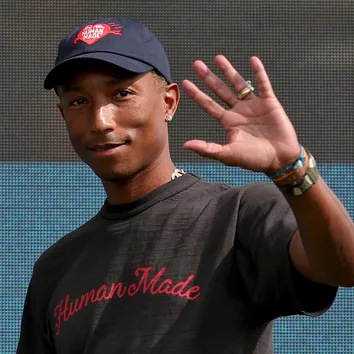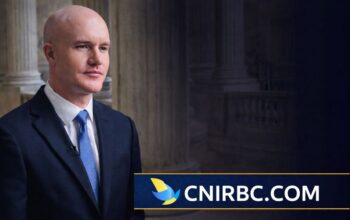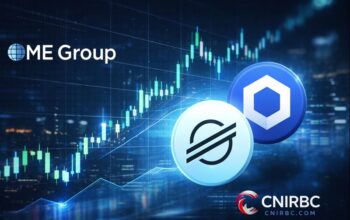 At VeeCon, the musician described how he sees blockchain technology changing the world for the better.
At VeeCon, the musician described how he sees blockchain technology changing the world for the better.
Musician, producer, and fashion designer Pharrell Williams believes that a revolution is coming that will shake up the music industry, the financial system, and even government—and he thinks that blockchain and decentralized Web3 technology are key to it.
Williams appeared at VeeCon on Saturday, and during an onstage interview with entrepreneur and event creator Gary Vaynerchuk, the artist—known for the hit songs “Happy,” “Get Lucky” with Daft Punk, and “Drop It Like It’s Hot” with Snoop Dogg—described his introduction to NFTs and how he sees the underlying technology empowering social progress.
An NFT acts like a proof of ownership for an item, and they’re often used for digital goods such as artwork, profile pictures, collectibles, and even music tracks. They can provide access to gated communities and experiences, as well, and are expected to serve as building blocks for the metaverse—a more immersive future internet.
Williams said that he began exploring the concept of NFTs a couple years back, and that he was “late to it.” Vaynerchuk returned a facial expression suggesting that Williams’ take was inaccurate—that he was actually early to NFTs, given that the market just took off in 2021—which elicited laughter from the audience.
https://twitter.com/GisforGREAT/status/1528056816072069122?s=20&t=2mvrD_wqW6-5l–SFhh4Rg
“When I say I’m late, it’s because I thought about it more than I did anything about it,” Williams explained. “And thoughts are awesome, because thoughts are things, right? But it doesn’t really matter until you do something about it.”
More recently, the 13-time Grammy Award winner has been exploring the creative potential for NFTs and the broader world of Web3 technology, including how it can disintermediate traditional music labels, entertainment studios, and distribution platforms, and enable more of a connection between artists and fans.
Music is a growing area of the NFT market, and artists like Snoop Dogg, The Chainsmokers, 3LAU, and Nas have been some of the leading proponents of using blockchain tokens to release music and provide additional benefits to fans—such as a cut of streaming royalties to people who buy their NFTs.
Williams said that there’s some downside to the rapid rise of the NFT market, particularly those who might jump in solely to make money without a long-term vision. “You deal with people who are just hanging around, trying to catch a quick buck,” he said. “You guys call them ‘grifters.’”
On the flip side, however, NFTs can provide new types of benefits to artists. He noted the ability for artists to receive secondary market royalties from NFT sales that can be built into the smart contract (or underlying code) that powers such assets. In the traditional space, an artist may not see any further benefit after the initial sale of a work.
Williams described a couple of Web3 endeavors he’s working on, including the Gallery of Digital Assets, which he described as “a safe space for traditional artists who’ve done really well to have a place where they can transition into the digital world.” He said that other platforms help veteran artists enter Web3, but that it “might not be what you want it to be at the end.”
Another initiative is Black Ambition, a nonprofit program aimed at supporting startups from Black and Latinx entrepreneurs. Black Ambition has a Web3 category, and the program provides mentorship to chosen startups along with up to $1 million in funding.
Ultimately, Williams believes that the stakes in the blockchain and Web3 space are even greater than just shaking up tech and entertainment. He believes decentralized communities and creators will be able to effect significant change in the world, pushing back against governments that seek to limit or strip away human rights.
“You come here talking to the people about the blockchain and Web3. What you should know is, this is a moment in time where everything is changing right now,” he said. “You all are looking at these old systems—you know that they’re antiquated, you know that they don’t work. And you are standing up, and you’re saying, ‘No more.’”
He noted the recent market downturn that sent crypto and NFT prices sinking—which contrasted heavily against the “summer camp”-like vibe of VeeCon—but suggested that it would be only a temporary downturn as the underlying technology continues to gain momentum.
“Yes, we’re in a recession. Yes, your crypto is gonna go down like everything else. But you know what? It’s gonna hold, because it was founded on something very different than what Wall Street was founded on,” he said, pointing out the legacy of slavery for the financial epicenter.
Williams continued to speak in grandiose terms about the potential for decentralized technology to shake up current systems and create more equitable models for everyone.
“Blockchain and Web3—it’s unlocking something that is scaring the system,” he said. “They are working really hard to put laws together to try to legislate around your concept, your idea. You all are the most powerful human beings on this planet. You don’t know it yet.”



